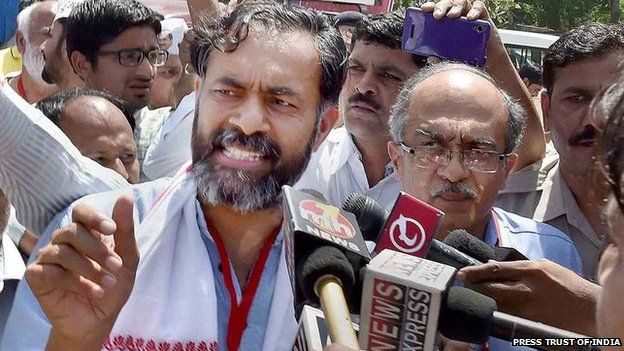Is India's Aam Admi Party no place for intellectuals?
- Published

Vaclav Havel, the Czech Republic's first president after the Velvet Revolution against communist rule, once said that politics needs more intellectuals.
"I hear objections," Havel, a former dissident playwright wrote. "Politicians must be elected; people vote for those who think the way they do."
But, he argued eloquently, a politician "should also seek to win people over to his own ideas, even when unpopular." Politics must "entail convincing voters that the politician recognises or comprehends some things better than they do, and that it is for this reason that they should vote for him".
I don't know whether Arvind Kejriwal, leader of India's anti-corruption Aam Admi Party (AAP), would agree with Mr Havel. But many believe that Monday's midnight expulsion of four senior members of the party, including founder members Yogendra Yadav and Prashant Bhushan, marks the retreat of "intellectual politics" and dissent in a party which rode to power in the capital, Delhi, promising an invigorating narrative of corruption-free, democratic politics.
Mr Yadav is a leading psephologist and political scientist, while Mr Bhushan is a well-respected lawyer. Anand Kumar, another senior member who was also expelled, is a sociologist. They believe that a cult of personality has grown around Mr Kejriwal, and according to Mr Bhushan, the "dreams of a movement have been shattered by a small coterie and a dictator".
Arun Kumar, a Delhi-based economist and a party supporter, regrets that the "intellectual climate and democratic culture on which the party was founded is gradually diminishing. It seems real intellectuals are posing insecurity to Arvind Kejriwal".
On the other hand, analysts like Ajaz Ashraf believe that the rebellion in the AAP also arose from "intellectual hubris and a sense of entitlement arising from class superiority" of the rebels. It isn't a coincidence, he says, that three of the national quartet of rebels were academicians.
The jury is out on whether intellectuals make for good politicians. Gary Gutting, a professor of philosophy at the University of Notre Dame in the US, has written that "good politicians need not be intellectuals, but they should have intellectual lives".
India has a long history of intellectuals as top notch politicians: Jawaharlal Nehru, Subhas Chandra Bose, Ram Manohar Lohia, C Rajagopalachari, Abul Kalam Azad. But, as sociologist Shiv Visvanathan says, India - and its politics - has been "de-intellectualised" over the years. "We have experts and we have policy makers. But apart from one exception - political psychologist Ashis Nandy - we don't have any public intellectuals. There is no real intellectual dissent in India any longer." Politics, he says, has been further debased by elected politicians with criminal records.
What has happened with the AAP, Shiv Visvanathan says, is the "banalisation of politics". A party which promised to accommodate a diversity of opinion had to get rid of some of its star dissenters.
That is what many here see as the real tragedy.
- Published10 February 2015